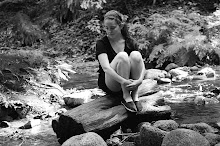For Mariana Richardson (1830-1891)
1
She dreamed along the beaches of this coast.
Here where the tide rides in to desolate
the sluggish margins of the bay,
sea grass sheens copper into distances.
Walking, I recite the hard
explosive names of birds:
egret, killdeer, bittern, tern.
Dull in the wind and early morning light,
the striped shadows of the cattails
twitch like nerves.
2
Mud, roots, old cartridges, and blood.
High overhead, the long silence of geese.
3
"We take no prisoners," John Fremont said
and took California for President Polk.
That was the Bear Flag War.
She watched it from the Mission San Rafael,
named for the archangel (the terrible one)
who gently laid a fish across the eyes
of saintly, miserable Tobias
that he might see.
The eyes of fish. The land
shimmers fearfully.
No archangels here, no ghosts,
and terns rise like seafoam
from the breaking surf.
4
Kit Carson's antique .45 blue,
new as grease. The roar
flings up echoes
row on row of shrieking avocets.
The blood of Francisco de Haro,
Ramon de Haro, Jose de los Reyes Berryessa
runs darkly to the old ooze.
5
The star thistles; erect, surprised,
6
and blooming
violet caterpillar hairs. One
of the de Haros was her lover,
the books don't say which.
They were twins.
7
In California in the early spring
there are pale yellow mornings
when the mist burns slowly into day.
The air stings
like autumn, clarifies
like pain.
8
Well I have dreamed of this coast myself.
Dreamed Mariana, since her father owned the land
where I grew up. I saw her picture once:
a wraith encased in a high-necked black silk
dress so taut about the bones there were hardly ripples
for the light to play in. I knew her eyes
had watched the hills seep blue with lupine after rain,
seen the young peppers, heavy and intent
first rosy drupes and then the acrid fruit,
the ache of spring. Black as her hair
the unreflecting venom of those eyes
is an aftermath I know, like these brackish,
russet pools a strange life feeds in
or the old fury of land grants, maps,
and deeds of trust. A furious dun-
colored mallard knows my kind
and skims across the edges of the marsh
where the dead bass surface
and their flaccis bellies bob.
9
A chill tightens the skin
around my bones. The other California
and its bitter absent ghosts
dance to a stillness in the air:
the Klamath tribe was routed and they disappeared.
Even the dust seemed stunned,
tools on the ground, fishnets.
Fires crackled, smouldering.
No movement but the slow turning
of the smoke, no sound but jays
shrill in the distance and flying further off.
The flicker of lizards, dragonflies.
And beyond the dry flag-woven lodges
a faint persistent slapping.
Carson found ten wagonloads
of fresh-caught salmon, silver
in the sun. The flat eyes stared.
Gills sucked the thin annulling air.
They flopped and shivered,
ten wagonloads. Kit Carson
burned the village to the ground.
They rode some twenty miles that day
and still they saw black smoke
smear the sky above the pines.
10
Here everything seems clear,
firmly etched agaist the pale
smoky sky: sedge, flag, owl's clover,
rotting wharves. A tanker lugs silver
bomb-shaped napalm tins toward
port at Redwood City. Again
my eye performs
the lobotomy of description.
Again, almost with yearning,
I see the malice of her ancient eyes.
The mud flats hiss as the tide turns.
They say she died in Redwood City,
cursing, "the goddamned Anglo-Yankee yoke."
11
The otters are gone from the bay
and I have seen five horses
easy in the grassy marsh
beside three snowy egrets.
Birds cries and the unembittered sun,
wings and the white bodies of birds,
it is morning. Citizens are rising
to murder in their moral dreams.
Tuesday, November 18, 2008
Subscribe to:
Post Comments (Atom)

2 comments:
http://www.guernicamag.com/interviews/429/the_consequences_an_interview/
"One of the things I thought while I was writing the poems in Field Guide, and it’s something I guess I still feel, is that poetry had in the hands of various people become a place for inconvenient knowledge insofar as it was a place for knowledge at all. But it was a place where you could talk about other kinds of experience than the official version.
For example, nobody growing up in California really studied California history (and there are probably a lot of problems with this analogy), but during the time the Vietnam War was going on, I was reading about the history of the west in the 19th century, which was in many ways a land grab. I was thinking that our history doesn’t look at our own violence, the violence in our own past, and we go out and repeat it someplace else. One of the poems that tries to think about politics in Field Guide is a poem called “Palo Alto, the Marshes” that I wrote partly because I discovered in my reading that the daughter of the guy who began the San Francisco rancho land grab, whose fiancé was murdered by Kit Carter and a couple of Pawnee Indians in the reeds off San Quentin during the Bear Flag War, retired to a ranch in Redwood City near Palo Alto, where I was studying. That ranch had become the Dow Chemicals napalm manufacturing plant and the place from which some of the napalm was being shipped through the Golden Gate on freighters to Vietnam. So, we don’t know our own story."
Post a Comment